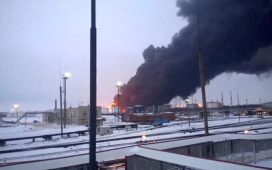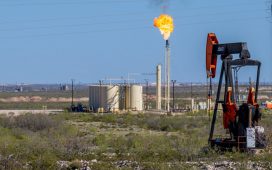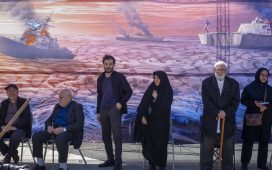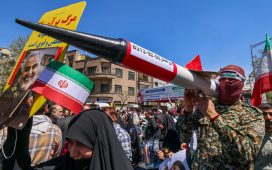
Iranian President Hassan Rouhani. Governed by religious clerics, Rouhani is struggling to save his … [+]
There is simply no sanctuary for Iran’s state run oil industry.
China has all but abandoned it because of U.S. sanctions. France will be hard pressed to do business with them due to the extraterritorial nature of the Iranian sanctions, coupled with a history of at least one French bank, BNP Paribas, being fined for running afoul of U.S. sanction policy. The stranglehold on Iranian oil could not be tighter.
The message is clear from Washington, buy oil from these guys and risk punishment.
Last week, the State Department imposed sanctions on Chinese company Shandong Qiwangda Petrochemical; Hong Kong-based Triliance Petrochemical, and Hong Kong-based Jiaxiang Industry for buying or transporting oil products from Iran, finished in dollars.
They also hit two of the executive officers of the companies identified above, Ali Bayandarian, managing director of Triliance Petrochemical, and Zhiqing Wang, chairman and legal representative of Shandong Qiwangda Petrochemical Co., Ltd.
One can argue that China is also on Washington’s hit list, so it makes them an easy target. But the United Arab Emirates is not. They are a huge buyer of U.S. defense contractor products and services. But UAE firm Beneathco is now sanctioned for working with Iran’s National Oil Company. That company is seen as a key source of cash for the Islamic Revolutionary Guard Corp’s Quds Force, designated a terrorist group by the U.S.

Secretary of State Mike Pompeo speaks at the Commonwealth Club in San Francisco, Monday, Jan. 13, … [+]
“The economic pressure that we have put in place cut off roughly 80 percent of the Iranian oil revenues. We are determined to get at that last 20 percent.”
Quds was once commandeered by General Qasem Soleimani, killed by a U.S. drone strike in December setting off hyperventilating remarks by newly minted Iran experts that President Trump was starting World War III.
If economic war is akin to the conventional use of weapons and arms, then Iran is under siege. It’s economy has been in a recession for the past two years. The World Bank said it may flatline this year, which is better than contracting. But that was before the latest sanctions squeeze. This move puts other countries on notice and is another major blow to the Iranian economy.
It gets worse.

Persian rugs. Banned. Who wants to finance the import of Iranian carpets, now sanctioned under a new … [+]
On January 10, Trump announced sanctions that went beyond oil and gas and now targeted construction, mining, manufacturing and textile goods. Imports of Iranian goods into the U.S. have fallen to zero. Exports are all humanitarian goods, such as medicines and medical equipments.
Consecutive administrations have attempted to bleed the Iranian economy of funds believed to be used to finance terrorist operations around the world. Going after sectors never hit before is part of the Trump Administration’s strategy of “maximum pressure”.
“This latest round further constrains what people are able to do with Iran,” says Alan Enslen, head of Baker Donelson’s International Trade and National Security Practice. “The prohibitions on what U.S. companies and individuals can do has been a line in the sand drawn long ago. The most significant part of this latest executive order is an expansion of restrictions on what non-U.S. parties can do,” he says about so-called “secondary sanctions.”

BNP Paribas was once fined over $8 billion for running afoul of U.S. sanctions on Iran. What lender … [+]
Foreign companies and the lenders they do business with may, or may not, be in trouble for doing business with Iran. This includes export business, and domestic business. If you’re DHL delivering fabric samples to Iran, the onus is on DHL for shipping a product now under the sanctions policy of the United States. Corporate lawyers will interpret things their own way and take risks as they see fit.
Nobody likes this, especially in Europe where companies in the energy space have had relationships with Iran for years, says Enslen.
It may even be legal to do business in some sectors with Iran; think healthcare related goods, for instance. But will a bank like BNP Paribas, once fined a whopping $8.9 billion for sanctions violations in Iran, be willing to take on that risk?
Business with Iran has decreased since Trump pulled out of the nuclear agreement made under the Obama Administration. Many companies around the world assumed sanctions would be lifted fully on Iran if that nuclear deal remained in place. It never did. Sanctions on oil remained. But most business was not banned. Companies felt comfortable with the risks they were taking in buying Iranian oil, or working in Iran’s oil market domestically.
But when Trump pulled the plug on the nuke deal, all the sanctions returned, new ones were added within months, and the European companies that thought all was well on their end were caught between Tehran and Washington.
“Given the choice — do business with Iran or disavow the U.S. financial system — I’ve never seen anyone chose Iran,” says Enslen.
Earlier this month, Secretary of State Mike Pompeo spoke about the Iran policy post-Soleimani at the Hoover Institution at Stanford University. He said the goal was to “deprive the regime of resources it needs to perpetrate its malign activity around the world”
Germany, France and Italy have put travel bans on a company called Mahan Air, a privately owned Iranian airline that supposedly ferries weapons to battle zones.
Last year, Argentina and the United Kingdom both added Iranian government backed Hizballah to their list of international terrorist groups.
Pompeo went on to say that the U.S. wants to squeeze the last dollar out of the last drop of Iranian crude.
“The economic pressure that we have put in place cut off roughly 80 percent of Iranian oil revenues,” he told a gathering at Stanford. “We are determined to get at that last 20 percent.”








